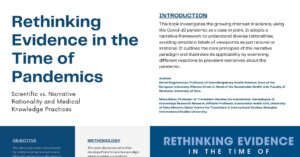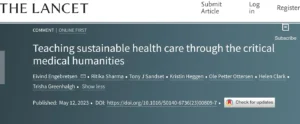This chapter outlines the overall aims and rationale for the book and explains how it differs from two established models in the study of medicine: evidence-based medicine and narrative medicine. It argues that science is inevitably and inextricably embedded in a multitude of narratives told by both scientists, and non-scientists and further acknowledges that scientific claims are themselves narratives. Whatever their factual status, scientific statements are ultimately assessed on the basis of people’s lived experience and the values they hold most dear. While accepting that scientific evidence has a key role to play in shaping public policy and should – in an ideal world – be taken seriously by members of the public, we argue that it is often mistrusted and/or overridden by considerations that are affective and social in nature. These considerations, in turn, are informed by the narratives to which we are all socialized over many years and in numerous contexts.
Read the chapter here.



